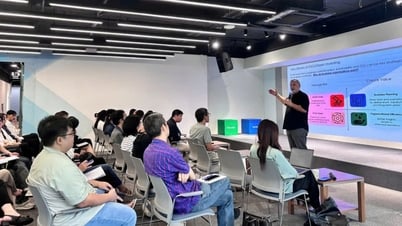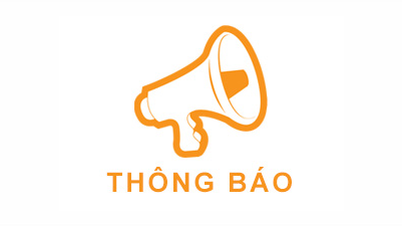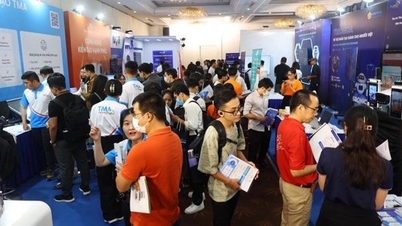In the digital transformation race, the Vietnamese banking industry is creating a vivid picture of innovation and challenge. With impressive results, banks are not only improving their competitiveness but also contributing to the creation of a digital economy . However, there are still bottlenecks that need to be resolved in order for digital transformation activities to bring about appropriate efficiency for banks as well as better support the economy.
From goals to talking numbers
Recently, the State Bank of Vietnam has actively implemented the plan for digital banking transformation until 2025, with a vision to 2030, approved by the Governor of the State Bank of Vietnam, Nguyen Thi Hong. The State Bank of Vietnam regularly ranks quite high among ministries and branches in the index of creating digital transformation institutions. The leaders of the State Bank of Vietnam have requested commercial banks to closely follow the direction of the Prime Minister with a consistent viewpoint of taking people and enterprises as the center and orienting the digital transformation of the banking sector with customer experience as the measure.
The State Bank of Vietnam leaders emphasized the view that "Digital transformation is no longer a choice, but a matter of survival". In practice, up to now, more than 87% of adults have had payment accounts at banks and many banks have processed over 95% of transactions on digital channels. The average growth in the number of mobile payment transactions and QR codes over the years from 2017-2023 reached over 100%/year. Banking technology infrastructure is regularly invested in, upgraded and developed. The interbank electronic payment system processes an average of 830 trillion VND/day (equivalent to 40 billion USD), the financial switching and electronic clearing system processes an average of 20-25 million transactions/day.
The benefits of digital transformation have helped commercial banks enhance their competitiveness through improved performance, reduced costs and improved customer experience.
Speaking to the press, Mr. Nguyen Hung, General Director of Tien Phong Commercial Joint Stock Bank ( TPBank ) said: TPBank has comprehensively applied cloud computing, big data and artificial intelligence (AI) technology in the bank's operations. One of the important steps is the combination of diverse cloud storage technology, helping to modernize data infrastructure, improve performance on all transaction channels and develop machine learning models.
The application of the most modern technologies helps TPBank save time in developing and operating new models by 40%. The bank has also developed and implemented 8 data science and machine learning projects. Customer experience at TPBank has also been improved, thereby increasing the bank's ability to retain customers. With the support of modern technologies, TPBank has built an ecosystem of advanced banking products and services, thereby enhancing the bank's competitiveness in the market by increasing the ability to support customers, from meeting diverse needs to providing rich utility services through digital transaction channels.

Mr. Vu Thanh Trung, Vice Chairman of the Board of Directors of MB, said: In 2024, MB will help customers make 6.5 billion transactions on digital channels. Of which, the MBBank application alone recorded 20 million transactions/day, with a stable, safe and secure system. The number of customers transacting on MB's digital channels currently accounts for about 96.7%, with a successful transaction rate of 99.96%; maintaining the leading position in terms of scale of the National Payment Joint Stock Company of Vietnam (NAPAS).
MB pioneered the development of a super application including more than 200 small applications (mini apps) integrated into the banking application. Customers can perform banking transactions anytime, anywhere with just a smartphone. With one login to the MBBank application, customers can easily perform many different transactions such as: online loans, savings deposits, bill payments, hotel bookings, airline tickets, telecommunications, online shopping, charity...
MB leaders said that the bank has invested heavily in the information technology system with an amount of approximately 50 million USD/year, allocated to 3 main areas: Building technology infrastructure, training human resources and implementing automation projects with 2,000 information technology personnel, accounting for 10% of total personnel. AI, Machine Learning, Deep Learning technologies are integrated into customer care and internal operations to automate service delivery processes and risk control...
Along with investment and technological innovation, MB always focuses on keeping customer information safe and secure through the application of advanced technology and multi-layered security; closely coordinating with the Department of Cyber Security and Prevention of High-Tech Crime (A05)...
From the perspective of a large bank participating in promoting digital transformation, Vietcombank's leaders said: This bank has deployed a customer care system using AI and big data to personalize the experience, providing more effective consulting and support services. Notably, Vietcombank's Call API solution was awarded the "Customer Experience of the Year - Banking" award by The Asian Business Review. The Call API solution allows customers to call directly from the VCB Digibank digital banking application to Vietcombank's call center via the internet. In addition, customers can request a call back when the line is busy or redirect calls to a chatbot. This technology is based on the WebRTC platform, integrated with the bank's existing VoIP call center system. One of the highlights of this solution is the ability to authenticate users through accounts and passwords on the VCB Digibank application. Vietcombank also invests in AI to analyze customer data, increasing automatic credit approval rates.
Banks and the challenge of leveraging digital flows
Besides positive results, the digital transformation process in the banking industry still faces many challenges such as: perfecting the legal framework, ensuring information security and safety, and developing high-quality human resources; investment costs in technology infrastructure, human resource training; the problem of balancing innovation and risk management (cyber security, data security)...
Mr. Nguyen Hung, General Director of TPBank shared: One of the biggest challenges is having a good enough infrastructure system and technology solutions to ensure competitive advantage compared to other banks, as well as fintech companies or other online business platforms, when the ability to meet customer needs of competitors is very strong.
Not to mention, the rapid changes in customers' preferences and habits also pose a significant challenge for banks, which must constantly research and innovate products to meet the increasingly high and diverse needs of customers.
Finally, maintaining and improving consistency and synchronization in customer experience across all transaction channels is also a challenge for TPBank as the bank needs to ensure that customers always have good and consistent experiences, no matter which channel they use.
To promote digital transformation to bring high efficiency in the coming time, Mr. Nguyen Hung, General Director of TPBank emphasized: Developing high-quality human resources and resources for digital transformation is always one of TPBank's top priorities. Regarding the plan to expand digital banking services in the future, TPBank is continuing to develop and upgrade its digital services. The bank has built a multi-channel digital ecosystem, connecting with more than 100 partners inside and outside the financial industry. This helps TPBank provide services and products that suit customers' needs, from online payments, personal financial management, to non-financial services such as travel and insurance.
TPBank is collaborating with fintech companies and technology startups to enhance customer experience and expand its influence. With this strategy, TPBank hopes to continue to actively contribute to the development of the digital economy and provide fast and convenient transaction solutions for businesses and people.
A representative of the Military Commercial Joint Stock Bank (MB) said that in order for digital banking transformation to be more effective, it is necessary to issue specific regulations on banking data security, ensuring network security standards and risk management processes. The legal system must also require compliance with international standards to improve integrity and security. Banks need to take clear responsibility when security violations occur and have strict sanctions for non-compliance. In addition, it is necessary to build a mechanism to protect users' rights, establish a dispute resolution process and regulations on privacy protection. Strengthening cooperation between management agencies and international cooperation is an important factor in dealing with high-tech crimes...
According to MB leaders, the banking system needs to identify risks, thereby regularly updating security policies... to protect customers' rights and also contribute to enhancing the reputation and sustainable development of the bank in the context of increasingly complex network security.
Authorities need to more effectively deal with the methods and tricks of criminals in electronic banking activities, thereby proposing solutions to ensure security and confidentiality.
Government leaders have identified opportunities and challenges in digital banking transformation, thereby setting out key tasks and solutions in the coming time, clearly demonstrating the view that banks need to take people as the center of service, contributing to the larger goal of developing a comprehensive digital economy of the country.
Specifically, the head of the Government has requested the banking sector to build a national database of customers, connecting with population data to promote digital transformation and develop the digital economy. Coordination with the Ministry of Public Security will help effectively exploit information on chip-based citizen identification cards, VNeID, improving safety and convenience in providing banking services. The banking sector needs to expand data connectivity with ministries, sectors, and apply advanced technologies such as AI and big data to develop modern services and secure customer information.
At the same time, focus on training, attracting high-quality human resources, learning from international experiences to meet the requirements of digital transformation. In addition, the Government leader emphasized that ensuring security and preventing high-tech crimes is an urgent task. The banking industry needs to closely coordinate with the Ministry of Public Security and management agencies in controlling risks, monitoring and preventing financial crimes.
Notably, the Government leader emphasized the role of propaganda work, helping people and businesses clearly understand the benefits of digital transformation, thereby promoting active participation in the digital financial ecosystem.
Source: https://baodaknong.vn/ngan-hang-va-bai-toan-chuyen-doi-so-241671.html


























![[Photo] Off-road racing: Adventure sport, attractive tourism product](https://vphoto.vietnam.vn/thumb/1200x675/vietnam/resource/IMAGE/2025/9/14/45123bd29c884b64934da038d947d344)





































































Comment (0)